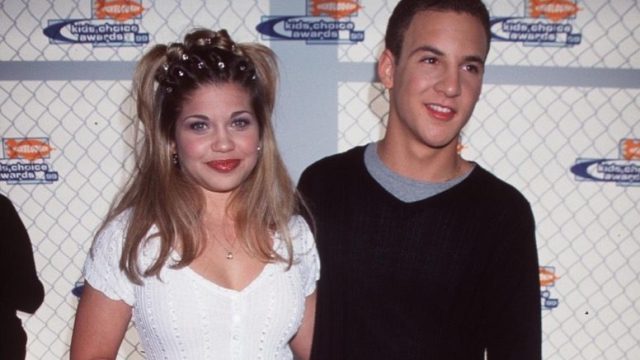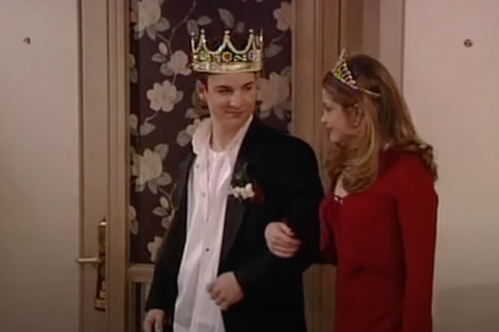5 TV Episodes That Only Aired Once Before Being Banned

It’s not uncommon for a television episode to be deemed inappropriate for a certain age group (we’ve all seen those “viewer discretion advised” warnings), but it’s not too often that it will be banned from TV altogether. Of course, there are exceptions to this rule. Maybe it was poor judgement by the screenwriters or just unfortunate timing, but a few TV episodes barely got to see the light of day. Read on to see what episodes you’ll never see on TV again and why.
READ THIS NEXT: The Saddest TV Episodes of All Time.
1
The Amanda Show: “The Lucklesses”

The Amanda Show, an incredibly popular show in the early 2000s starring Amanda Bynes, was usually relatively tame. However, one particular episode, “The Lucklesses” that aired on March 17, 2001, was the outlier. The premise of the episode features a family with the worst luck ever (literally).
It starts simply by losing a board game, then escalates quickly to getting robbed, then to the entire family getting struck by lightening. Unfortunately, this family’s awful luck doesn’t end there. At the end of the episode, their home gets hit by a powerful asteroid that ends up destroying their entire house.
Tragically, six months after the episode aired, the attacks of September 11th occurred in New York City. As reported by E! News, the network decided not to re-air “The Lucklesses” after the horrific attacks took place, determining that it was too “violent” for viewers.
2
Dance Moms: “Topless Showgirls”

Dance Moms, a popular reality series on Lifetime, showcases young girls and pre-teens taking dance at the Abby Lee Dance Company. Abby Lee Miller, its owner, is known for her harsh and abrasive attitude towards the young girls, but this episode still took an inappropriate turn that no one saw coming.
In “Topless Showgirls” that aired on March 6, 2012, Lee creates a dance routine that gives the illusion that the girls, who range in age from 8 to 13, are topless (they are just wearing undergarments). Despite theirs mothers obvious discomfort, the pre-teens perform the number in a dance competition anyway.
Due to the sexualized nature of the episode, Lifetime decided to pull the episode after it aired. The network told Today that this episode wasn’t appropriate to be viewed on television and scrapped it from digital outlets as well.
For more entertainment sent right to your inbox, sign up for our daily newsletter.
3
Sesame Street: “The Wicked Witch Episode”

It’s hard to imagine anything from the beloved Sesame Street being banned, but “Episode 0847,” otherwise known as “The Wicked Witch Episode,” which aired on February 10, 1976 was deemed too frightening for kids. The episode features actress Margaret Hamilton, who played the Wicked Witch of the West in The Wizard of Oz, reprising her iconic role.
In the episode, the witch loses her broomstick, and upon trying to retrieve it, it looks like she has been struck by lightening. Throughout the episode, the witch threatens to turn Big Bird into a feather duster and poor David into a baseball. In a final attempt to get her broom stick back, the witch decides to dress up as a normal looking woman. She succeeds and cackles happily as she flies back to Oz, only to see her broom fall once again out of the sky. Compared to her actions in The Wizard of Oz, this Sesame Street segment seemed tame. But for many young kids at home, the witch was utterly terrifying.
After airing, according to an article from Mashable, PBS received a large amount of letters from furious parents. Though the episode was meant to teach children about overcoming their fears, the network gave in to the backlash and after airing only once, it was shelved permanently.
4
Arthur: “Mr. Ratburn and the Special Someone”

Arthur is a beloved animated series created by PBS that doesn’t seem too likely to stir up any kind of controversy. But, the show’s 22nd season premiere, “Mr. Ratburn and the Special Someone” ended up being banned in one state, Alabama, due to the episode featuring a same sex wedding.
In the episode which aired on May 13, 2019, third-grade teacher Mr. Ratburn’s students overhear him on the phone with a woman named Patty planning his wedding. They assume this is his wife-to-be, but later find out that it is his sister and he is marrying his male partner, Patrick. The students are delighted by this surprise, but this couldn’t be further from the truth for Alabama’s Director of Programming, Mike McKenzie.
McKenzie’s statement to AL.com indicated he was notified of the episode in April and after viewing it, decided not to put the episode on air again. “Parents have trusted Alabama Public Television for more than 50 years to provide children’s programs that entertain, educate, and inspire,” wrote McKenzie. “More importantly—although we strongly encourage parents to watch television with their children and talk about what they have learned afterwards—parents trust that their children can watch APT without their supervision. We also know that children who are younger than the ‘target’ audience for Arthur also watch the program.”
It’s a shame this episode was banned in Alabama, but fortunately, the episode gathered praise and applause from fans all over social media, including LGBTQ rights advocate groups.
READ THIS NEXT: The Most Hated TV Couples of All Time.
5
Boy Meets World: “Prom-ises Prom-ises”

Boy Meets World follows the beloved character, Cory Matthews, while he tries to balances school, his girlfriend, and his friends all at once. In the episode, “Prom-ises, Prom-ises” which premiered in season 5, Cory takes Topanga to prom and the two love birds discuss moving their relationship to the next level, aka losing their virginity to one another. Eventually, they leave prom to go to a hotel room.
At the end of the episode, the couple decides not to seal the deal after all and they head back to prom to have more PG fun. Unfortunately, their mature decision wasn’t mature enough for Disney at the time and Disney decided to never air “Prom-ises, Prom-ises” again due to the sexual nature of the episode.